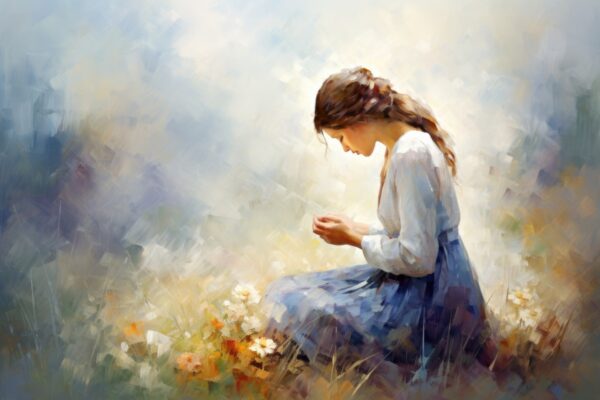Within every one of us is an impulse to create — to tiptoe into a dim, dawn-lit kitchen before the children arise to shape, score and bake a loaf of sourdough; to kneel in earth dampened by April showers, pulling weeds and planting seeds; to sit at a sun-splashed desk, scrawling lines of poetry; to carry new life within and then nurture that life for years to come. Yes, we all long to bring forth something new, something beautiful, and this is no mere coincidence. We are this way because we are made in the image and likeness of the Creator.
Our urge for creativity flows from the very core of our being — the way the Father fashioned us. In the beginning, he tasked Adam and Eve with being fruitful. This call to fruitfulness is intertwined with our propensity for creativity, for “to create” is synonymous with “to bear fruit.” Thus, creativity is written into our nature and, when utilized, both makes us more human and draws us closer to the Father. In his “Letter to Artists,” Pope St. John Paul II wrote that “through his ‘artistic creativity’ man appears more than ever ‘in the image of God’ … [who] passes on to the human artists a spark of his own surpassing wisdom, calling him to share in his creative power.’” Through creating, we communicate and share in the art of the Creator and, in turn, become more human — more the way he intended us to be — because we are, in a sense, answering his command to Adam and Eve.
Want more Radiant? Sign up for our weekly newsletter!
This command is so glorious because, when we obey it, we bring beauty into the world. This is the very purpose of our fruitfulness and creativity: to glorify God and love others by ushering in new beauty. Beauty always points to God because he is the origin of all things good and true and beautiful. Therefore, when we do anything that mirrors these properties of our heavenly Father, it reflects him to the world. When the poet Gerard Manley Hopkins penned the lines of his poem entitled “Pied Beauty,” he simultaneously created something beautiful with phrases such as “fresh-firecoal chestnut-falls; finches’ wings” and praised God for the beauty he created (quite literally given the subject of the poem and the poem’s final line). When Michelangelo painted the ceiling of the Sistine Chapel, he too mimicked the Creator by producing beauty. And, of course, his work, that, with masterful line and curve, retells the creation of Adam, points others to almighty God. When a young woman, standing in a church’s choir loft or even in the nursery of her firstborn, lifts her voice in song, she also imitates and glorifies God, leading others to his goodness with the beautiful melody she offers. Yes, our creativity has been given as a gift, and we must offer it back as a gift.
The Lord has given every one of us a specific ability that allows us to generate beauty. For many women, the highest call to creativity is motherhood, for we partake in the sacred creation of another human life. This answers, in the most literal sense, God’s words to Adam and Eve: “Be fruitful and multiply.” Creativity in motherhood, of course, extends far beyond the physical bearing of children; it encompasses all that a mother does to form her children — from preparing meals for them to educating them to leading them to the Father with gentle caresses that are the first expressions of love their little ones will know. Regardless of one’s vocation, though, we are all called to be fruitful. We are all called to use our talents — even if we consider them small and simple — to speak of God’s glory. For some, that may look like opening a small business to sell the works of one’s hands. For others, it may look like baking cakes or playing the violin or crocheting blankets or creating floral arrangements or authoring novels. There is creative ability within every being, and it has only to be humbly tapped into in order to produce and flourish.
This task to be fruitful and creative may seem like an immense challenge, but, truthfully, it is so natural an inclination that it will flow forth effortlessly when we simply offer it to the Lord and ask him what it is that he wants us to do. He will not ask too much of us. He will ask only to do that which he readily equips us to do. If we lay ourselves before the One who created us, eager to accept and utilize any and all gifts he has given us, we will yield the sweetest fruit. Pope St. John Paul II in his aforementioned letter wrote, “You are invited to use your creative intuition to enter into the heart of the mystery of the Incarnate God and at the same time into the mystery of man.” With this gift of our creativity, we are invited to come to know God better, to know ourselves better, and to lead others into this same deeper knowledge! We are invited to bring beauty into this world that so desperately needs it! Our Father has written this ability — a share of himself — into our very beings. Let us not let this piece of ourselves lay fallow. Let us cultivate it, tend to it, and allow it to prosper so that the earth can abound with more and more signs of him who is Beauty.




